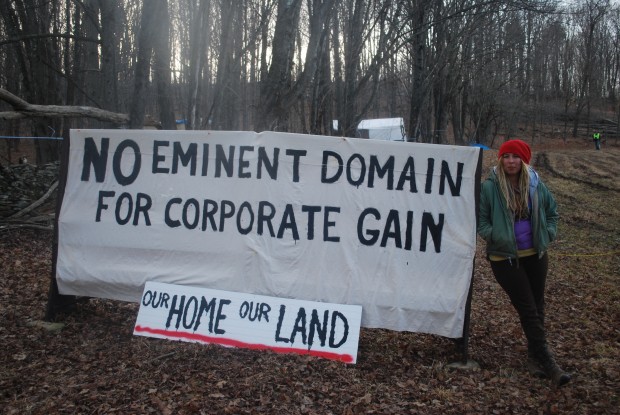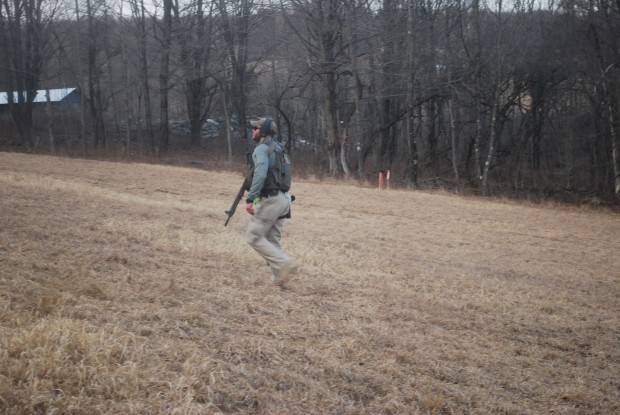Friends and foes of Constitution Pipeline await appeals court ruling
-
Jon Hurdle

Jon Hurdle / StateImpact PA
.Megan Holleran stands by a sign on her family’s land. The Hollerans lost their court battle to save their maple trees from eminent domain seizure. The trees were cut to make way for the proposed Constitution Pipeline.
Nine months after heavily armed federal marshals patrolled a tree-cutting operation for the proposed Constitution Pipeline on a northeast Pennsylvania maple tree farm, the pipeline’s builders and its critics are awaiting a court ruling that may determine whether the project can proceed.
The Williams Companies is appealing a decision by New York State that denied a water-quality permit for the 124-mile natural gas pipeline from Susquehanna County, PA to Schoharie County, NY, halting the project even after trees had been cut on some parcels of land along the Pennsylvania portion of the route.
The trees were cut to make way for the pipeline on several properties including a 23-acre Susquehanna County lot owned by the Holleran family which became a symbol of resistance to the project after men with chainsaws felled several acres of maple trees on March 1, 2016, while marshals carrying semiautomatic rifles kept protesters away.
The incident fueled opposition to the project and highlighted wider concern about the pipeline industry’s use of eminent domain to seize private land from owners such as the Hollerans who have refused corporate offers of compensation.
Now, both sides await a ruling by the Second Circuit Court of Appeals which is hearing the Williams case against the permit denial in April by New York’s Department of Environmental Conservation which said the pipeline plan failed to meet its water-quality standards.
The decision was hailed by critics but came too late for the trees from which the Hollerans harvested maple sap to make syrup.
Williams, which heads a consortium of four companies, says it is determined to pursue the project.
“The company remains steadfastly committed to the project and is optimistic the Court will announce its decision in 2017,” company spokesman Christopher Stockton wrote in an email. “In light of the pending legal challenges, the project’s in-service date is targeted as early in the second half of 2018, which assumes that the legal challenge process is satisfactorily and promptly concluded.”

Jon Hurdle / StateImpact PA
An armed U.S. marshall on his way to accompany two tree cutters at the Holleran property on Tuesday, March 1 2016.
If it is built, the pipeline would carry enough gas from Pennsylvania’s Marcellus Shale to fuel about 3 million homes, the company says.
Megan Holleran, whose family bought the New Milford Township property in the 1950s, said the family is in “limbo” because it has been unable to find a lawyer and does not know when or whether it will have a federal court hearing to seek compensation for the loss of its trees.
“We’re in a unique position since the construction of the pipeline is stalled and uncertain,” Holleran wrote in an email. “We haven’t had our compensation hearing and have no idea when it will (if ever) be scheduled.”
She also said the family can’t find an appraiser to assess the value of damage done to the land “since they all have a conflict of interest due to work with the gas industry.”
Holleran said the only appraisal was done before a federal judge granted Williams eminent domain, and that the appraiser at the time calculated a “reasonable compensation” figure based on an assessment that classified the land as “unused rural space.”
As a result, the land’s stated value does not reflect the loss of income from the maple trees, the loss of usable land for future construction, and the fact that the pipeline would be in the back yard of a house on the property, Holleran said.
She said the family does not have a specific compensation sum in mind but is just seeking an accurate assessment of damages from the tree cutting.
Despite the ongoing battle with Williams, Holleran said the company has been “surprisingly accommodating” since the project was halted. The company has developed an alternate plan that would use existing roads to come on to the property in order to clear the felled trees, she said.
Whoever loses at the Second Circuit is likely to appeal the case to the U.S. Supreme Court, predicted Lynda Farrell, executive director of the Pipeline Safety Coalition, a Pennsylvania-based nonprofit that advises landowners on how to make informed decisions on pipeline projects.
Farrell said New York State is unlikely to back down on the issue. “They’ve worked hard and intelligently, with factually based assessments to back up the denial of permits,” she said.
The case could be a bellwether for both sides, she said, but its influence may depend on whether the incoming Trump administration seeks to promote fossil fuels by boosting the pipeline industry.
“I’m not sure we’ll see much of anything happening with oil and gas, even on the state level, until after the administration is sworn in,” Farrell said.
















